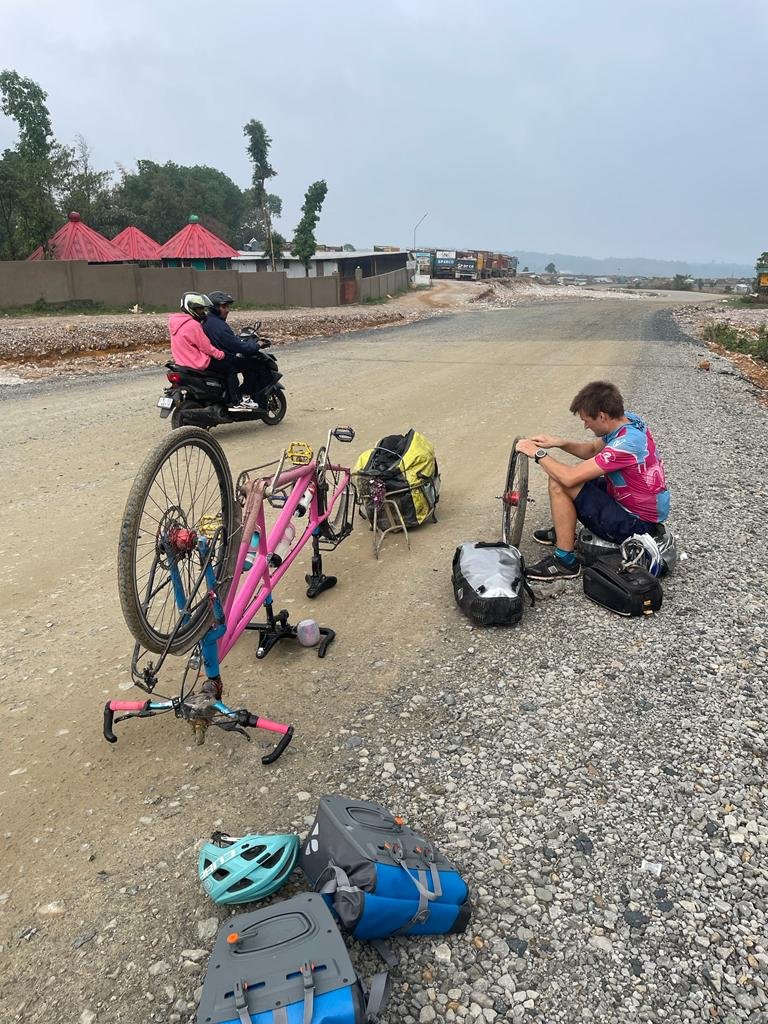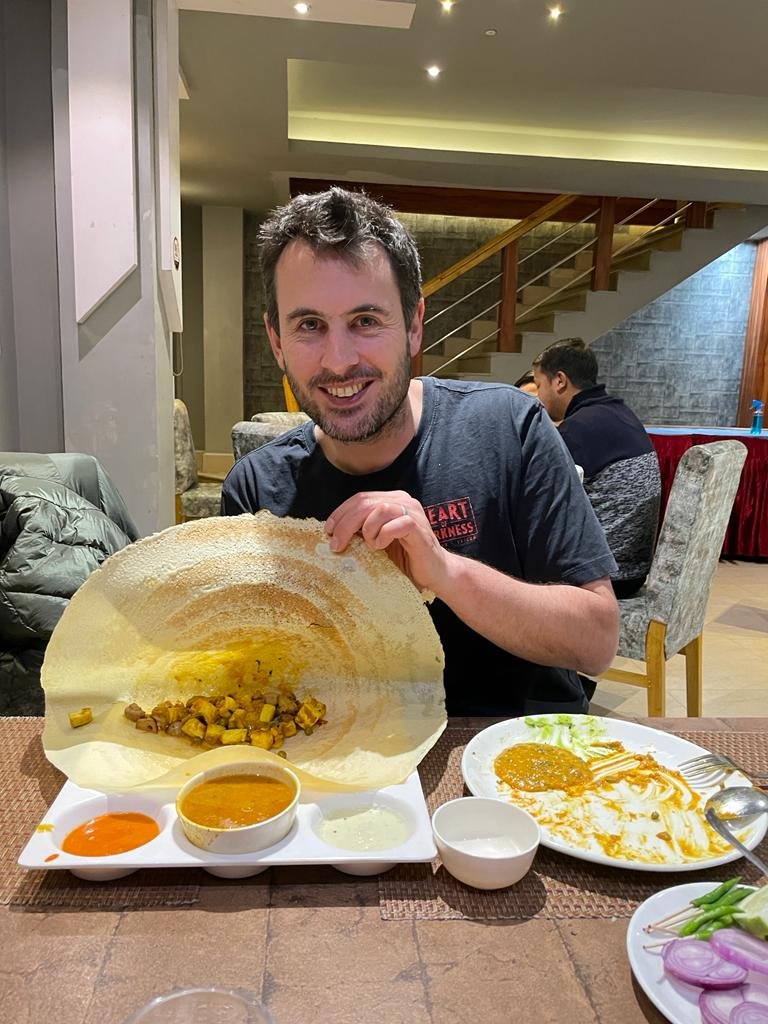A Baptism by Flood: The Meghalayan Mountains
It wasn’t the easiest first day for Tom. Admittedly, we were only cycling 35 kilometres. However, in that short distance we would be climbing 1500 metres: more climbing than I had done across the entirety of India and Bangladesh. Added to this, on the morning of our departure there was torrential rain. It’s fair to say that Tom was getting thrown in at the deep end.
Tom and I were reunited in the Indian town of Dawki, which lies right on the India-Bangladesh border. One the far side of the Meghalayan mountains from Assam, it had the feel of a frontier town: slightly battered, almost neglected, with one road lined with spindly shops and a few veg sellers displaying their tomatoes on the roadside. There was one bank in a wooden building. Power cuts were frequent – the powerline had been levelled by a recent storm – or a drunk truck driver, depending on who you believed.
Though we were not particularly attached to Dawki, Tom and I only set off at midday, once the rain had abated. After one kilometre of fairly flat road, we crossed a suspension bridge (One lorry at a time, a sign reassuringly read), and from there the narrow road headed steeply upwards. We changed into Chris’ lowest gears and pedalled hard. This would be the default for the rest of the day.
It was muggy and soon we were both drenched in sweat. As the gradient kicked up in places I could hear Tom’s grunts as he powered us up and round steep bends. I hoped he wouldn’t burn out later. The occasional car passed us, their shouts of “Well done! Well done!” or “Go! Go! Go!” or a thumbs up were welcome support as we ground our way up the mountain side.
The gradient was relentless and there were few moments of respite. Despite this, we made good progress through the green foothills. There was green forest surrounding us, and lamppost-like palm trees wobbling over us. A ripple of green hills framed the distance. It was the most beautiful and natural place I’d been through in months. To my surprise, I could hear bird calls. I was surprised because I realised how quiet it was. Throughout most of India and Bangladesh, I could barely hear what the second rider said on the tandem because of the constant road noise. Even my speakers at full volume were barely audible. For almost the first time since the mountains of Pakistan, I was able to hold a conversation at normal – if gasped – volume.
After a couple of hours of determined pedalling, we took a break in a small village, Pongtung. It was a Sunday and from the church came the soft sound of a hymn sung by the congregation. It was an altogether more peaceful part of India. A lady supplied us with some refreshing tea and a watery chickpea daal. Tom had been pedalling hard, whilst impressively keeping up his side of the conversation, yet only needed tea as sustenance. I, on the other hand, polished my way through five bowls of the daal. The lady didn’t bat an eyelid – and in contrast to other parts of India – Tom and I enjoyed our tea in peace.
A welcome tea break!
Then things got tough (perhaps I should say tougher). We got one flat tire, and then another soon afterwards, costing us precious time as our shadows lengthened. Tom engaged several curious truck drivers in conversation leaving me to change the tube in peace. The drivers were in their teens and their trucks were filled with rocks for Bangladesh (which has almost no stone, creating a strong cross-border trade for the stuff. There’s never enough stone, so in Bangladesh bricks are made then broken to form the “stone” needed for cement). Thankfully for us, the border was closed on Sundays we weren’t sharing the narrow winding road with these young guys in their lorries, but Tom asked them to go easy on us the next day.
My favourite: fixing roadside punctures.
By the time the second puncture was fixed it was beginning to get dark and we still had another two hours of riding ahead. Then it began to rain.
A few large splats rapidly became a plastering torrent, and we slogged up the steep winding road thoroughly drenched. Luckily, it wasn’t too cold so as long as pedalled hard, but I worried what would happen if we got another puncture. Then, we would get really cold.
We reached a small town, Pynursla, in the dark. The rain continued to hammer down. We were the only people outside, but we passed shops and cafes with people huddled inside them, their feet wet from the large drops exploding off the road. When I later described this to my grandfather he told me the proper expression was “raining stair rods”, and he’d often experienced this sort of weather in Singapore, back in the day.
“They no longer think this is impressive. They’re just feeling sorry for us!” Tom shouted at me through the rain. I nodded, not in the mood to reply.
We were now almost at the top of the ridge, but Mother Nature wasn’t done with us yet. Thick fog enveloped us. It was rather disconcerting to see headlights appear out of the fog thirty metres ahead, at some speed. I hoped we wouldn’t get rammed from the back, but decided not to share the thought with Tom.
From the sense I could get of where we were it reminded me a lot of Scotland: wet, windy, foggy, grassy, boggy and hillocky. The thought didn’t make me any better disposed towards Scotland.
Fumbling around in the fog and rain in India’s Scotland.
After overshooting the turning, we found our road to our accommodation and an eternity (ten minutes) later we arrived at the bunkhouses. We dived inside, dived back outside for dry clothes, and then dived back in. I put the kettle on. Priorities.
You would have thought we would have slept like logs after the day’s trials, yet once again, Mother N had other ideas. After abating for several hours, at around midnight the rain returned. The noise on the corrugated iron roof was deafening. Huge thunder claps rang out every few minutes. It felt very cosy to be warm and dry witnessing this – it just simply wasn’t possible to sleep.
The next morning it looked like Chris the tandem had been attempting swim lessons. Chris was tire-deep in water, and our porch was flooded, the water just a centimetre below the level of our floor. After a late breakfast, which included a wide ranging conversation with our host Victor (including genealogy, the tribal regions, business and the existence of God), we set off again.
Thank you Victor!
It was a Monday and the roads should have been filled with trucks, yet they were almost empty. After forty five minutes we found out why. A huge landslide had obliterated 100 metres of road. Three JCBs were busy scooping and shovelling dirt. One car had been swept across the road by the landslide and was lodged into the sand teetering at the very edge of the road.
“Three hours,” said the foreman. That’s how long it would take them to clear the dirt. We didn’t have three hours, and so we stripped the bags from Chris and gingerly picked our way across the rocks and clay and sand, carrying bike, bags and trailer. The advantages of a tandem.
Cycling does upper-body workout.
After more climbing and fog we emerged on the far side of the mountains. The climate changed dramatically: the smell of cedar and hot soil was in the air. It reminded me of Spain. That evening we descended hairpin after hairpin in the fading sunlight to take us into Shillong, the mountain capital of Meghalaya. We had conquered the Meghalayan mountains.
It had been an intense two days: 2500 metres of climbing, rain, fog, punctures and a landslide, but Tom and I had made it in one piece (well, two pieces). Tom’s first days on the Bristol2Beijing expedition had been intense beyond expectation, but he had survived his baptism by flood.
The reward of Shillong: Tom uncovering the delights of the dosa.






